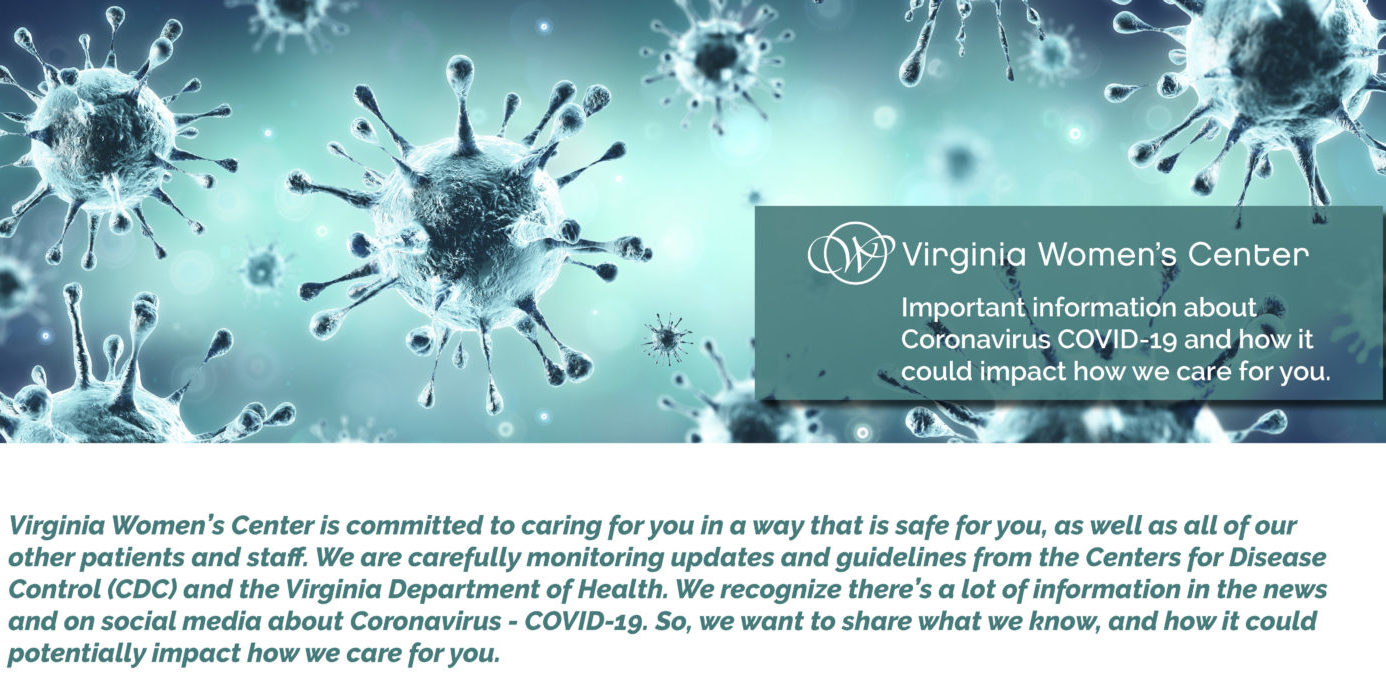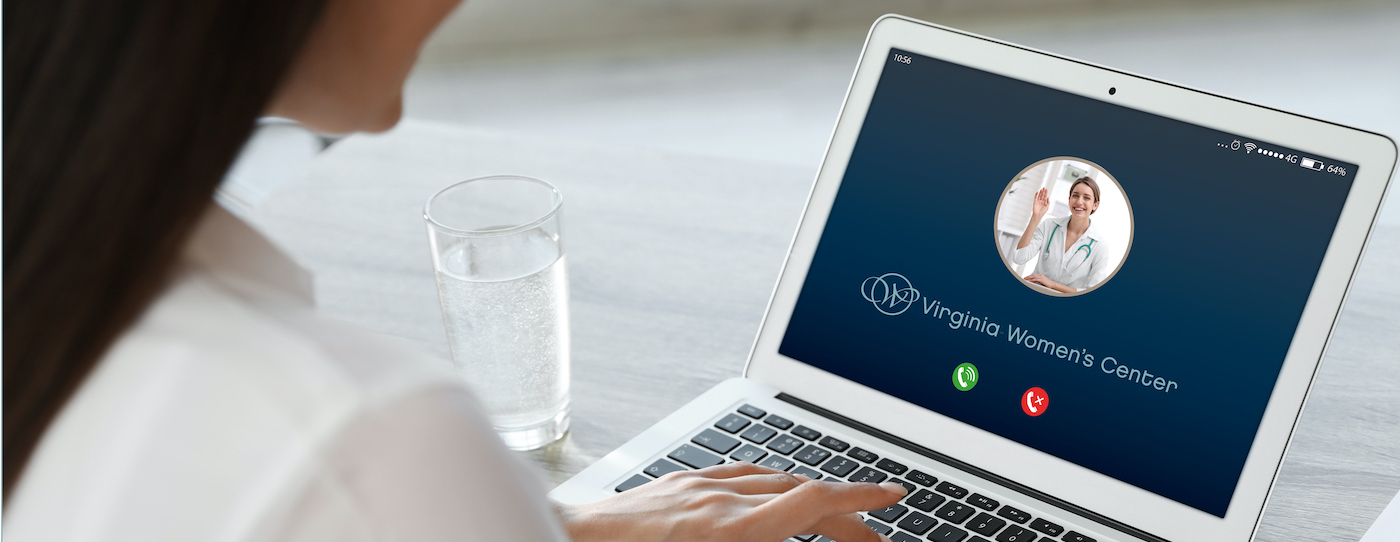
HOW DOES THE CORONAVIRUS – COVID-19 IMPACT HOW WE CARE FOR YOU?
ANNUAL WELL-WOMAN EXAMS, MAMMOGRAMS & SCREENINGS
If you have COVID-19, symptoms of COVID-19, or recently traveled to an area where COVID-19 is known to be prevalent, should you come in for preventative care such as my annual well-woman exam, mammogram or other screenings?
No, please call 804.288.4084 or send a message through the secure patient portal to reschedule your routine care. Your primary care doctor or hospital emergency department is better equipped to provide you with care specific to COVID-19. Routine gynecologic care and screenings can wait until after you’re feeling better and symptom-free for 14 days without the use of medications for fever, cough, etc.
GYNECOLOGIC PROBLEM
If you have COVID-19, symptoms of COVID-19, or recently traveled to an area where COVID-19 is known to be prevalent, should you come into the office for a gynecologic problem such as a yeast infection, urinary tract infection (UTI), bacterial vaginosis, etc.?
No, please call 804.288.4084 or send a message through the secure patient portal to share your health concern(s) with a member of your care team. We may be able to diagnose and devise a treatment plan over the phone/portal or request you schedule a virtual visit to get a better understanding of your health concern.
PREGNANCY CARE
If you’re pregnant, how will we care for you and your unborn child if you have COVID-19, symptoms of COVID-19, or recently traveled to an area where COVID-19 is known to be prevalent?
If you’re pregnant, understandably, you may be scared or anxious about the potential impact of COVID-19 on you or your unborn child. Virginia Women’s Center has protocols in place to ensure that you can get the care you need throughout your pregnancy, even if you get the Coronavirus. Please call 804.288.4084 or send a message through the secure patient portal to discuss options for upcoming appointments or follow-up care. If you are close to delivery, notify the Labor & Delivery unit of your selected hospital so that they may make appropriate infection control preparations to keep you safe and provide the best care for your baby, while ensuring the safety of other patients and healthcare workers. Click here for information from the CDC regarding the impact of the Coronavirus on pregnancy.
ULTRASOUND APPOINTMENTS DURING THE PANDEMIC
An ultrasound is a window into your baby’s developing world. It’s the first glimpse you’ll ever have of your child. We understand that having a baby is an incredibly exciting time and you want to share every milestone with your partner, but we have to put your health and that of your unborn child first.
Please understand that we need to minimize the exposure of our ultrasonographers, physicians and other healthcare providers in order to protect them and the other patients they come in contact with daily.
For the duration of the pandemic, we are relaxing our no-cell phone rule for a specific portion of the ultrasound appointment. Once all of the necessary measurements have been taken, you will be permitted a short period of time to Facetime or Skype with your partner so that he/she can see the baby on the screen.
(Please set up and test your FaceTime or Skype technology with your partner prior to arriving for your appointment.)
VISITOR POLICY
Given the current health crisis, we can no longer allow visitors to accompany you to in-office appointments.
We don’t want to seem uncaring, truly. We understand that schools are out and childcare is challenging, spouses/partners want to be included, and future grandparents are over the moon with excitement. But, as healthcare providers, we must do our best to ensure your safety, as well as the safety of all of our patients. And, our duty to limit the spread of COVID-19 in our community and flatten the curve so as not to overwhelm our hospitals and urgent care centers.


We now can address many of your healthcare concerns with a VWC Virtual Visit. If your upcoming appointment is for a gynecologic problem or follow-up consultation, please call 804.288.4084. We will ask you a series of questions to determine if we can care for you virtually (telehealth), or if an in-office exam is necessary.
Your health and wellbeing are our top priority as we navigate this unprecedented period of uncertainty and disruption.
We appreciate your understanding of, and adherence to, the no-visitor policy.
Together, with your help, we can make a difference in our future by limiting the spread of COVID-19.
~The Physicians of Virginia Women’s Center
GENERAL INFORMATION ABOUT CORONAVIRUS COVID-19
What is it?
Coronaviruses are a family of viruses that can cause the common cold. Coronavirus COVID-19 is part of that same family of viruses, but is a new strain and can cause severe infections of the lungs and airways.
What are the symptoms?
Symptoms range from mild to severe but typically appear between 2 to 14 days after infection and include fever, dry cough, and shortness of breath. Some patients experience fatigue, muscle aches, sore throats, and/or headaches before the onset of the fever, cough, and shortness of breath typically associated with COVID-19.
How does it spread?
Like most viruses, COVID-19 spreads from person to person between people who are in close contact with one another (within about 6 feet) typically by respiratory droplets when an infected person coughs or sneezes. Or, by kissing. It’s also possible that you can get COVID-19 by touching a surface or an object that has the virus on it and then touching your mouth, nose, or eyes.
How can you protect yourself?
- Wash your hands frequently and well—for at least 20 seconds with soap and water.
- If you’re not able to use soap and water, use alcohol-based hand sanitizer (at least 60% alcohol) to kill any virus that might be on your hands. Cover all surfaces of your hands and rub them together until they feel dry.
- Try to avoid touching your face—eyes, nose, and mouth, so that the virus does not enter your body if it is on your hands.
- Clean frequently touched items at home such as phones, keyboards, doorknobs, light switches, faucets, sinks, toilets/toilet handles, tables, chair backs, counters, etc., regularly with a mixture of bleach and water—5 tablespoons of bleach per gallon of water.
Does wearing a standard surgical mask help avoid getting the virus if you’re not sick?
No! If you are not sick, wearing a standard surgical mask will not help you avoid getting the Coronavirus. But, if you become ill, you should wear a mask to minimize the likelihood of spreading the virus.
Who is at risk?
Everyone is at risk of getting Coronavirus COVID-19. But, many will experience mild symptoms or none at all. Seniors and those with a history of lung issues/infections, heart issues, diabetes, or compromised immune systems are most at risk. For the most part, children don’t seem to be affected—probably because they’re exposed to the Coronavirus frequently in schools, daycare centers, etc.
![]()
![]()





